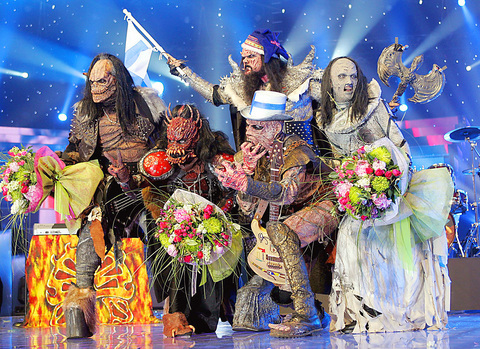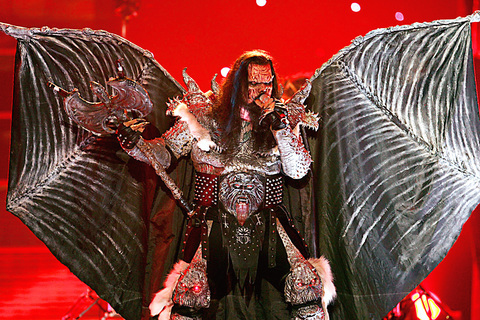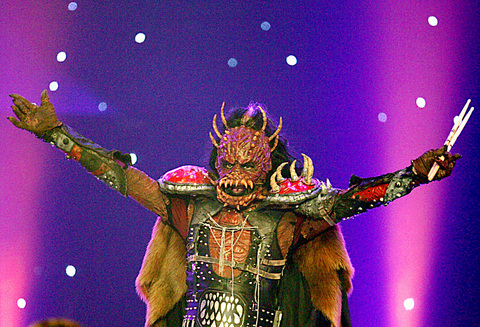Finnish rockers Lordi won the 2006 Eurovision Song Contest late Saturday -- a stunning upset in a
competition better known for bland dance music and bubble-gum pop.
The cartoon metalheads, who sport latex monster masks and spark-spewing instruments and sing about "the Arockalypse," fought off a strong challenge from Russian heartthrob Dima Bilan to take the 51st annual music prize.

PHOTOS: AGENCIES
"This is a victory for rock music ... and also a victory for open-mindedness," lead singer Lordi told a news conference after the win -- Finland's first.
"We are not Satanists. We are not devil-worshippers. This is entertainment," he added.
Bosnia-Herzegovina's Hari Mata Hari was third in the contest, which was decided by phone and text message votes from viewers in 38 European countries.

The phantasmagoric Finns, who scandalized some compatriots when their song Hard Rock Hallelujah was chosen to represent the Nordic nation, was the surprise hit of the competition.
Combining crunchy guitars, a catchy chorus and mock-demonic imagery, Lordi is reminiscent of US 1970s stars KISS -- an acknowledged inspiration of frontman Lordi, who comes from Lapland in Finland's far north.
Band members never appear without their elaborate masks and makeup, and do not reveal their true names.

Lordi beat an unusually eclectic 24-nation field, which ranged from the perky pop of Danish teenager Sidsel Ben Semmane and Malta's Fabrizio Faniello to the balladry of Ireland's Brian Kennedy and the country-pop of Germany's Texas Lightning.
Lordi received 292 points, the highest score in the contest's history. Many Finns were delighted.
"I think it was so great because we are always the losers in Eurovision and now we've got the most points ever in Eurovision history," said Nina Nezeri, 26, who was watching the televised contest at home in Helsinki with a group of friends.

"It's a good song. They look scary and everything but it's a good song."
Greek contestant Anni Vissi, who drew the biggest cheers from the Athens crowd, finished a disappointing ninth.
"It doesn't matter that we lost, we are also winners because Greece put on a great show," Vissi told state-run NET TV. "Those monsters -- I, for one, loved them."
Malta came last, with one point -- but at least it avoided the dreaded "nul points," a mark of Eurovision shame.
Since 1956, Eurovision has pitted European nations against one another in pursuit of pop music glory. Previous winners include 1960s chanteuse Lulu, Sweden's ABBA -- victors in 1974 with Waterloo -- and Canada's Celine Dion, who won for Switzerland in 1988.
Some 13,000 fans from across the continent packed Athens' Olympic arena for the three-hour contest, broadcast live in 38 countries to an audience estimated at 100 million.
Some had come to cheer on their nation's competitor, others to soak in the atmosphere of an event adored by fans of camp and kitsch around the world.
"It's the campiness, the glamour, the glitz, the sparkles. We come every year," said Jude Habib, a communications consultant from London, attending her fourth Eurovision with friend Mandy Norman.
"Our friends think we're mad," she said. "But for one week a year, we can be completely silly."
Eurovision victory is no guarantee of fame. Dion and ABBA went on to glory -- as did Olivia Newton John, who lost to ABBA while competing for Britain in 1974. Other winners have sunk without trace, victims of the "curse of Eurovision."
Athens is hosting the event because Greece won last year in Kiev, Ukraine.
The show opened in true Eurovision style, with a garish musical number inspired, organizers said, by Greece's rich history, mythology and sparkling seas. The hosts, Greek pop singer Sakis Rouvas and American Access Hollywood correspondent Maria Menounous, were flown in from the wings onto a set inspired by an ancient theater.
Broadcaster NBC announced plans earlier this year to replicate the formula -- a forerunner of American Idol-style talent contests -- in the US, with acts from different US states competing for viewers' approval.
The European Broadcasting Union, which runs Eurovision, said it was in talks with NBC over rights. If successful, the American version could go ahead as early as this fall, said the group's director of television, Bjorn Erichsen.

In the March 9 edition of the Taipei Times a piece by Ninon Godefroy ran with the headine “The quiet, gentle rhythm of Taiwan.” It started with the line “Taiwan is a small, humble place. There is no Eiffel Tower, no pyramids — no singular attraction that draws the world’s attention.” I laughed out loud at that. This was out of no disrespect for the author or the piece, which made some interesting analogies and good points about how both Din Tai Fung’s and Taiwan Semiconductor Manufacturing Co’s (TSMC, 台積電) meticulous attention to detail and quality are not quite up to

April 21 to April 27 Hsieh Er’s (謝娥) political fortunes were rising fast after she got out of jail and joined the Chinese Nationalist Party (KMT) in December 1945. Not only did she hold key positions in various committees, she was elected the only woman on the Taipei City Council and headed to Nanjing in 1946 as the sole Taiwanese female representative to the National Constituent Assembly. With the support of first lady Soong May-ling (宋美齡), she started the Taipei Women’s Association and Taiwan Provincial Women’s Association, where she

It is one of the more remarkable facts of Taiwan history that it was never occupied or claimed by any of the numerous kingdoms of southern China — Han or otherwise — that lay just across the water from it. None of their brilliant ministers ever discovered that Taiwan was a “core interest” of the state whose annexation was “inevitable.” As Paul Kua notes in an excellent monograph laying out how the Portuguese gave Taiwan the name “Formosa,” the first Europeans to express an interest in occupying Taiwan were the Spanish. Tonio Andrade in his seminal work, How Taiwan Became Chinese,

Mongolian influencer Anudari Daarya looks effortlessly glamorous and carefree in her social media posts — but the classically trained pianist’s road to acceptance as a transgender artist has been anything but easy. She is one of a growing number of Mongolian LGBTQ youth challenging stereotypes and fighting for acceptance through media representation in the socially conservative country. LGBTQ Mongolians often hide their identities from their employers and colleagues for fear of discrimination, with a survey by the non-profit LGBT Centre Mongolia showing that only 20 percent of people felt comfortable coming out at work. Daarya, 25, said she has faced discrimination since she